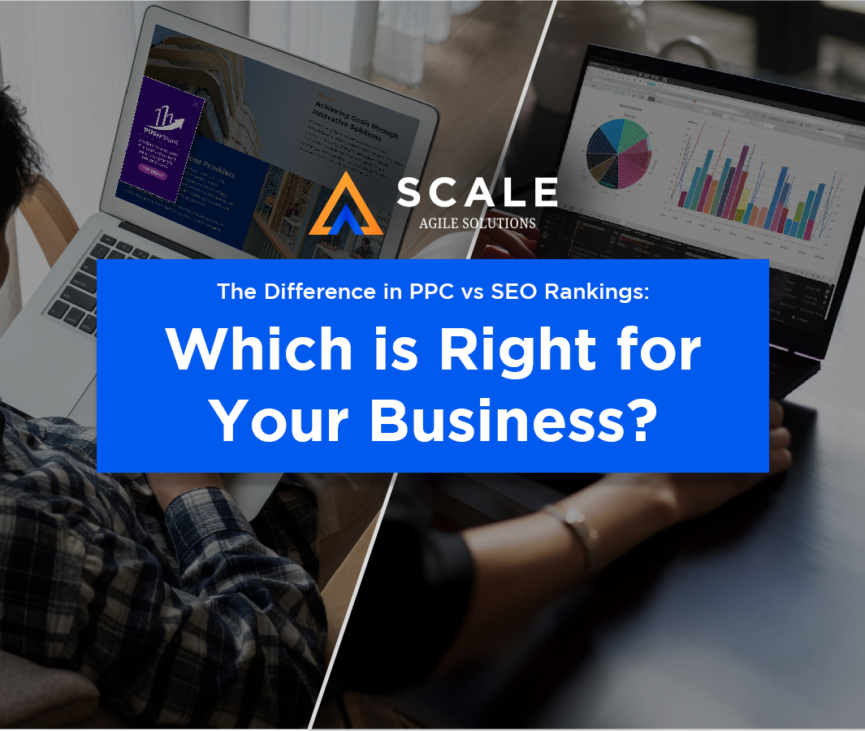When it comes to digital marketing, businesses are constantly exploring new avenues to enhance their online presence and reach their target audience. Two powerful strategies are pay-per-click (PPC) advertising and search engine optimization (SEO).
While both aim to boost a website’s online presence, they operate in distinct ways. Let’s examine the differences between PPC and SEO rankings to help you decide which approach is right for your business.
PPC: A Swift Boost to Visibility
As the name suggests, PPC advertising involves paying a fee every time a potential customer clicks on your ad. Essentially, it’s a way of buying site traffic rather than organically earning it.
Advertisers bid on specific keywords, and the highest bidder gets their ad displayed at the top or side of search engine results pages (SERPs) or on other websites through display advertising. Popular PPC platforms include Google Ads, Microsoft Bing Ads, and social media advertising.
PPC Pros
- Immediate Results: PPC campaigns can drive traffic to your site almost instantly.
- Targeted Marketing: Advertisers have precise control over who sees their ads, based on demographics, location, and user behavior.
- Measurable ROI: PPC provides detailed analytics, allowing you to track the success of your campaigns and make data-driven decisions.
PPC Cons
- Cost: Constant bidding wars for popular keywords can make PPC expensive.
- Dependency: Traffic stops once you stop paying for ads.
- Ad Fatigue: Users may develop ad blindness or irritation over time.
SEO: Building Organic Credibility
In contrast, SEO is about optimizing your website to rank higher in organic (non-paid) search results. This process involves multiple strategies, including keyword research and optimization, content creation, link building, and technical SEO.
Unlike PPC, where you pay for each click, SEO is a long-term investment that can result in continuous traffic and leads without additional costs. Various factors determine SEO rankings, including website quality, content relevance, user experience, and backlinks.
By following best practices and creating high-quality, valuable content, businesses can improve their organic rankings and attract more organic traffic to their website.
SEO Pros
- Sustainable Results: SEO efforts can lead to long-term organic traffic and sustained visibility.
- Credibility and Trust: High organic rankings often translate to trustworthiness for consumers.
- Cost-Effective in the Long Run: While initial setup may be resource-intensive, ongoing SEO efforts can be more cost-effective than continuous PPC spending.
SEO Cons
- Time-Consuming: SEO is a gradual process; results may take weeks or months to materialize.
- Algorithm Changes: Search engine algorithms evolve, requiring constant updates to maintain rankings.
- Limited Control: Unlike PPC, you have less control over where your site appears in search results.
Which is Right for Your Business?
The decision between focusing on PPC and SEO rankings depends on various factors, including your business goals, budget, and timeframe. Here are essential considerations:
1. Budget
PPC can provide quick results but requires a budget to pay for clicks continually. If your business has a limited budget, SEO may be a more cost-effective option in the long run.
2. Timeframe
If you need immediate results, PPC is the way to go. SEO takes time to build authority and rankings, so it’s a more long-term strategy.
3. Competition
If you’re in a highly competitive niche where established businesses dominate top rankings, PPC can help you gain visibility in the short term. Conversely, SEO can be a more sustainable option to close the gap with larger competitors gradually.
4. Conversion Goals
Consider the specific goals of your business. If your primary objective is to generate immediate sales or leads, PPC can drive conversions more effectively. However, if you’re looking to build brand awareness and establish long-term authority, SEO can be more beneficial.
5. Testing
PPC allows for more control and testing options. It’s easier to experiment with different ad copies, landing pages, and targeting options to optimize your campaigns. SEO, on the other hand, requires continuous monitoring and adjustments to improve organic rankings.
Ultimately, the best approach for your business may be a combination of both PPC and SEO. By leveraging the strengths of each method, you can create a comprehensive digital marketing strategy that drives both immediate results and long-term growth.
Reach More Customers Online with PPC and SEO
In the dynamic world of digital marketing, both PPC and SEO rankings play crucial roles in enhancing online visibility. The key is to understand the strengths and weaknesses of each approach and align them with your business objectives.
Whether you choose the immediate impact of PPC, the long-term benefits of SEO, or a combination of both, remember that consistent effort, monitoring, and optimization are crucial to achieving successful online marketing results.
Try our AI-powered toolkit PushGiant! Boost your online exposure in organic search results and connect with more customers.

